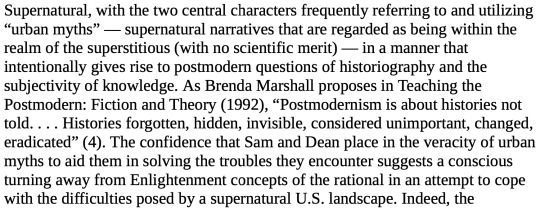#also the reason why the show couldn't sustain its early balance between deutragonists
Explore tagged Tumblr posts
Text

David Simmons, “There’s a ton of lore on unicorns too”: Postmodernist Micro-Narratives and Supernatural in TV Goes to Hell: an Unofficial Roadmap of Supernatural
started writing this mostly as a reflection on the above chapter from TV Goes to Hell. the show from its initial outset is based around a particular formula. the brothers often rely on a postmodern patchwork of stories to 'solve' their monster-of-the-week. on this show, everything can be real all together, all at once: from alternate myths and histories, to movie monsters, to urban legends, cultural gods, and folk tales. this cultural melange gets 'tamed' through the frame of the show's monster-of-the-week format itself, where everything gets solved to fit a singular narrative: identify the monster, find a way to defeat it, and successfully eliminate it (there are rare exceptions to this formula: bugs is the standout)
there's a tension between the characters' research, drawing from unofficial sources, local legends and civilian accounts versus the show's format demanding, in a sense, that fear of the unknown (really a fear of difference) be conquered through the simplified logic of its formula. unofficial sources and beliefs become incorporated into an official narrative, so to speak. they gain legitimacy and authority through our heroes use of them, not the other way around. magic is evil when a witch uses it, but somehow the rituals and spellwork our heroes use to defeat them don't count. you feel me. and that same logic applies to what monsters count as real and what doesn't. on this show, everything becomes real when our protagonists are able to see it and kill it.

(1.01, 'Pilot')

so a common show critique i see tends to separate the more episodic plots of the early seasons (1-3) from the more serialised grand epic narratives of 4-5 onwards. well my argument is this - nah, that impulse was there from the start! the mystery of the show was always going to dissipate, because explaining away the mystery was always a part of its initial premise. the concept that - 'the monster under your bed is no longer scary when you can name what it is and learn how to kill it' - turns into -> a fear of death? heaven and hell and everything else in between are now real, tangible places! fear over external, powerful forces meddling in your lives? demons, angels, leviathans, god himself! now all real and tangible beings! the air of horror and mystery shrouding s1-2 was never gonna last. the murky horror was always a means to a defeatable end.

(5.19, 'Hammer of the Gods')
anyways. there's an obvious mythological hierarchy in this series and it's very funny to me. all gods and spirits and monsters, even the ones predating christian mythology, fall under its ruling (white, judeo-christian) narrative authority. the postmodern embrace of multiple narratives is a ruse. all incompatible things lead to a universal truth. the show doesn't dispell the existence of differences; rather everything is to be combined, united under a totalising front, despite the contradictory nature of that impulse. this narrative then, down to its bare bones formula, is a civilising mission. civilisation barreling in, banishing fear and uncertainty from the light. and in order to stay in that light, one must submit to its complete authority. by this show's logic, uniformity ultimately requires the subjugation of difference.
#re: note essay on the last post. well time to release this stupid monster from the drafts lol#Unity..............#also the reason why the show couldn't sustain its early balance between deutragonists#that totalising impulse also applies to the gradual singular focus on one brother over another#rather sam's defiance gets eaten away bc that was always the inevitable end goal#preserving civilisation = a suppression of difference = no change can be allowed to the social order OR the story formula#this show's unintended? partially intended? brilliance to me is how its ideology stacks on several levels:#through an interpersonal dynamic between two brothers. through its episodic formula. and on a grand mythological scale#a discussion on abuse to me falls under the same umbrella as a discussion on the show's ideology#supernatural is a modern western#my meta#j.txt
22 notes
·
View notes